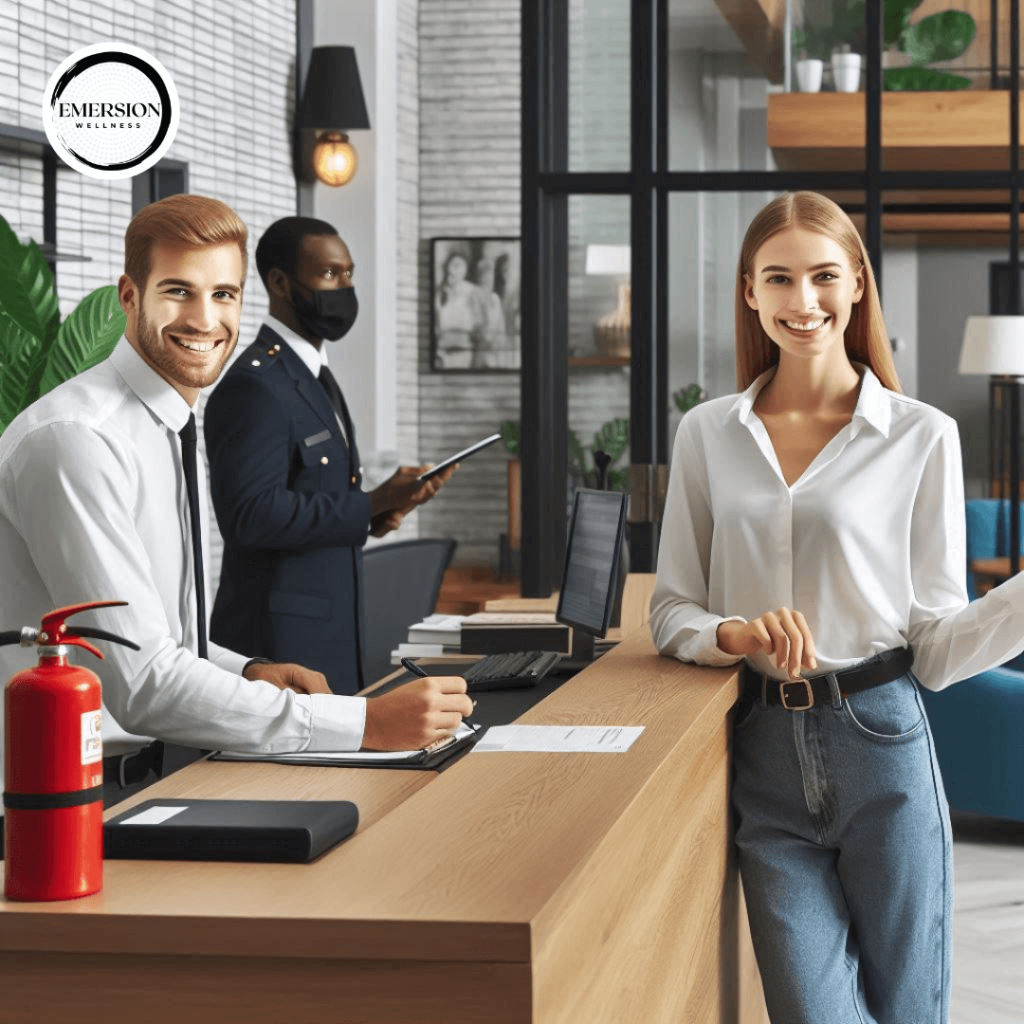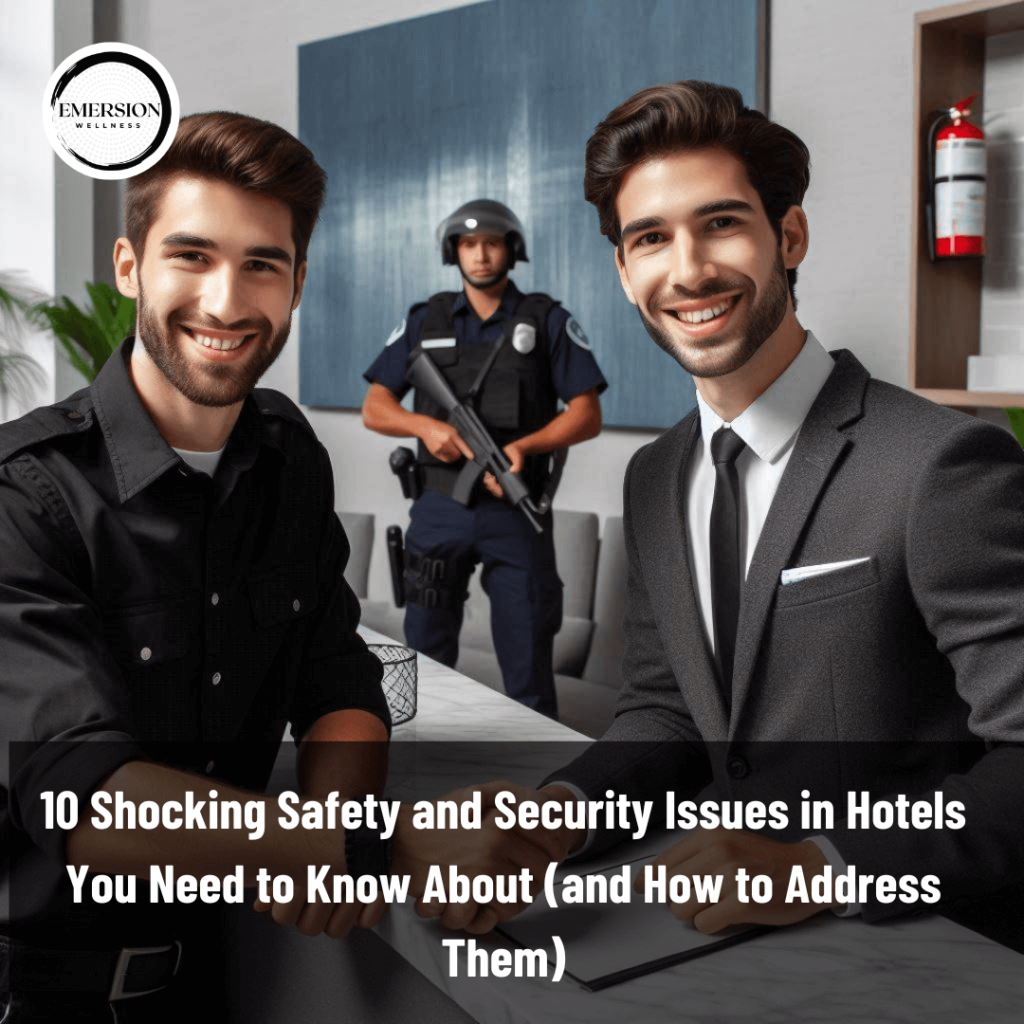In today's competitive hospitality industry, guest satisfaction reigns supreme. But what if a guest's sense of security is compromised? Safety and security issues can significantly impact guest experiences and, ultimately, a hotel's revenue. This begs the question: How can hoteliers create a safe and secure environment that fosters trust and loyalty?
Critical Takeaways:
- Guests prioritise safety and security when choosing a hotel.
- A comprehensive security plan mitigates risks and builds trust.
- Investing in guest education and staff training empowers informed decision-making.
- Technology offers innovative solutions to enhance hotel security.
The High Cost of Overlooking Safety and Security
According to a study by the International Hotel & Restaurant Association, 78% of travellers prioritise safety and security when selecting a hotel. Furthermore, negative online reviews from safety concerns can severely damage a hotel's reputation and revenue.
Real-life experience: While managing reservations at a hotel, we witnessed a significant decline in bookings following a guest reporting a theft from their room. This incident highlighted the importance of robust security measures in maintaining guest confidence.
Unveiling the Top 10 Safety and Security Concerns in Hotels
Let's delve into ten prevalent safety and security issues in hotels, along with actionable strategies to address them:
Guestroom Theft
Issue: The theft of guest belongings from rooms remains a significant concern. Cash, electronics, jewellery, and travel documents are frequent targets.
Solution:
- Implement secure locking systems. Electronic keycard systems and sturdy deadbolts offer better protection compared to traditional keys.
- Provide in-room safes. Safes offer a secure storage option for valuables, fostering guest peace of mind. Consider offering safes large enough to accommodate laptops and tablets.
- Train housekeeping staff on security protocols. Educate staff on recognising signs of forced entry and reporting suspicious activity.
Statistic: The American Hotel & Lodging Association reports that in-room safes can significantly deter guestroom theft.
Public Area Security
Issue: Public areas like lobbies, pools, and restaurants can be vulnerable to theft, vandalism, and disorderly conduct.
Solution:
- Maintain well-lit public areas. Improved lighting deters criminal activity and enhances guest safety, especially during evening hours.
- Deploy security cameras strategically. Visible cameras act as a deterrent and provide valuable footage in case of incidents. Ensure signage informs guests about camera surveillance.
- Invest in security personnel. Having a visible security presence in public areas discourages criminal activity and fosters a sense of security for guests.
Pro tip: Consider partnering with local law enforcement for increased security presence, especially during peak seasons or high-profile events.
Fire Safety
Issue: Fire hazards significantly threaten guest and staff safety. Proper fire safety protocols and equipment are crucial.
Solution:
- Conduct regular fire drills. Ensure staff and guests are familiar with evacuation procedures and the location of fire exits.
- Maintain and inspect fire alarms and sprinkler systems regularly to guarantee proper functioning in an emergency.
- Provide clear fire safety information in guest rooms, including evacuation maps and instructions on using fire extinguishers (if applicable).
- Invest in fire safety training for staff. Train staff on how to use fire extinguishers safely, identify fire hazards, and assist guests during an evacuation.
Real-life example: A recent news story highlighted a devastating hotel fire that tragically claimed multiple lives. The report cited malfunctioning fire alarms and inadequate staff training as contributing factors. This underscores the importance of prioritising fire safety measures.
Data Security Breaches
Issue: Guest data breaches can occur due to inadequate cybersecurity measures. Stolen credit card information or personal details can have severe consequences for guests.
Solution:
- Invest in robust cybersecurity solutions. This includes firewalls, data encryption software, and employee training on cybersecurity best practices.
- Limit access to guest data—only authorised personnel with a legitimate business need to access guest information.
- Implement secure payment processing systems. Ensure compliance with industry standards like PCI DSS for secure credit card transactions.
Data Breach Example: A major hotel chain recently experienced a data breach that compromised the personal information of millions of guests. This incident underscores the importance of prioritising data security.

Also, see 5 Advanced Security Systems for Hotels to Maximize Revenue and Enhance Guest Safety
Slip and Fall Accidents
Issue: Wet floors, uneven surfaces, and inadequate lighting can lead to slip-and-fall accidents, resulting in guest injuries.
Solution:
- Maintain a clean and well-maintained environment. Address spills and wet surfaces promptly. Ensure proper drainage in all areas to minimise pooling water.
- Maintain a clean and well-maintained environment (Continued). Fix uneven flooring or damaged carpets to minimise trip hazards.
- Post clear warning signs. Alert guests to potential hazards like wet floors or freshly mopped areas.
- Provide adequate lighting. Ensure all public areas and walkways are well-lit to improve visibility and prevent accidents.
Statistic: According to the National Floor Safety Institute, slip and fall accidents are the leading cause of liability claims in the hospitality industry.
Pool and Spa Safety
Issue: Pool and spa areas can pose drowning risks, especially for children. Improper supervision and inadequate safety measures can lead to accidents.
Solution:
- Enforce clear pool and spa safety rules. Post signage outlining guidelines like no diving in shallow areas, adult supervision required for children, and capacity restrictions.
- Provide adequate lifeguard presence. Ensure trained lifeguards are on duty during peak hours and whenever the pool or spa is open.
- Maintain proper pool and spa maintenance. This includes regular cleaning, chemical balancing, and ensuring the appropriate functioning of filtration systems and safety equipment.
Here's a tip: Consider offering complimentary pool safety workshops for children during their stay. This can raise awareness and equip them with basic water safety skills.
Real-life example: A recent news report highlighted a child drowning incident at an unsupervised hotel pool. This emphasises the importance of prioritising pool safety measures and implementing clear guidelines for adult supervision.
Guest Harassment and Assault
Issue: Guests can be vulnerable to harassment or assault in isolated areas of the hotel or during late-night hours.
Solution:
- Implement well-lit walkways and parking areas. Improve visibility in secluded areas to deter criminal activity.
- Offer escort services to guests upon request. This can be particularly helpful for guests arriving or departing late at night.
- Train staff on recognising and responding to harassment or assault situations. Empower staff to de-escalate situations and report incidents to security personnel promptly.
Here's a tip: Consider offering self-defence awareness workshops or informational brochures for guests to promote personal safety during their stay. This demonstrates a proactive approach to guest well-being.
Foodborne Illness
Issue: Improper food handling and storage practices can lead to foodborne illnesses, causing discomfort and health risks for guests.
Solution:
- Maintain high standards for food hygiene and sanitation. Implement strict food preparation, storage, and serving protocols, adhering to all relevant health codes.
- Invest in staff training on food safety. Ensure staff are knowledgeable about safe food handling practices to minimise the risk of contamination.
- Conduct regular kitchen inspections. Proactive inspections help identify and address any potential hygiene or sanitation issues.
Statistic: According to the Centers for Disease Control and Prevention (CDC), improper food handling is a leading cause of foodborne illnesses in the United States.
- Display clear food allergen warnings. Inform guests about potential allergens in menu items to empower informed dining choices.
Real-life example: A recent lawsuit against a hotel chain stemmed from a guest contracting a foodborne illness due to improper food handling practices. This incident highlights the importance of prioritising food safety measures and staff training.

Keycard Security Vulnerabilities
Issue: Lost or stolen keycards can grant unauthorised access to guest rooms, posing a security risk.
Solution:
- Implement keycard expiration upon check-out. This ensures that deactivated cards cannot be used to access guest rooms after check-out.
- Offer keycard deactivation options. Allow guests to deactivate lost or stolen keycards immediately to prevent unauthorised access.
- Consider implementing mobile key technology. Mobile key technology offers an alternative to traditional keycards, potentially reducing the risk of loss or theft.
Pro tip: Educate guests on the importance of safeguarding their keycards and promptly reporting any loss or theft. Consider offering lanyards or keycard holders for added security.
Lack of Guest Education and Awareness
Issue: Guests may be unaware of hotel safety protocols and evacuation procedures, potentially hindering their response in an emergency.
Solution:
- Provide clear safety information in guest rooms. This includes fire escape plans, emergency contact numbers, and safety instructions on using hotel amenities.
- Offer safety briefings upon check-in. Briefly inform guests about crucial safety protocols, evacuation procedures, and the location of fire exits.
- Utilise in-room safety videos to visually communicate critical safety information engagingly.
Remember: An informed guest is a prepared guest. Investing in guest education empowers them to make informed decisions and prioritise their safety during their stay.
Conclusion
Prioritising hotel safety and security issues is not just an obligation; it's a wise business decision. By implementing a comprehensive security plan, investing in staff training, and fostering guest awareness, hoteliers can create a safe and secure environment that fosters positive guest experiences and builds trust. Remember, a reputation for excellence in safety and security is a powerful asset in today's competitive hospitality industry.
Don't let safety concerns become a roadblock to your hotel's success! At Emersion Wellness, we understand the importance of creating a secure environment for your guests. While safety is paramount, we also recognise the need to maximise revenue and profitability.
Contact Emersion Wellness today to discuss innovative revenue-generating strategies, including our industry-leading weight loss program. This program has a proven track record of attracting new guests, boosting spa bookings, and increasing food and beverage sales, ultimately enhancing your hotel's bottom line. Invest in guest safety and unlock your hotel's full revenue potential!
Our weight loss program is designed to be a holistic experience, focusing on:
- Healthy meal options: Our on-site restaurants can create customised menus that complement the program's dietary guidelines.
- Fitness activities: Offer access to fitness facilities or partner with local gyms to provide guests with workout options.
- Relaxation and stress management: Promote spa services like massages or meditation sessions to aid in the weight loss journey.
By incorporating Emersion Wellness' weight loss program and prioritising guest safety, your hotel can cater to a broader audience, boost guest satisfaction, and achieve sustainable financial success.
FAQs: Frequently Asked Questions About Hotel Safety and Security
Here are ten frequently asked questions regarding hotel safety and security, along with informative answers to guide you:
1. What should I do if I feel unsafe in my hotel room?
If you feel unsafe in your room, contact hotel security immediately. Most hotels have a 24/7 security presence to address guest concerns. You can also request to be moved to a different room.
2. How can I prevent theft from my hotel room?
Use the in-room safe for valuables like jewellery, electronics, and travel documents. Always lock your room door securely whenever you leave, even temporarily. Be mindful of your belongings in public areas like the pool or spa.
3. What should I do if I witness suspicious activity in the hotel?
Report any suspicious activity to hotel security or staff immediately. Do not attempt to intervene yourself. Please provide a detailed description of the incident and the individuals involved.
4. What fire safety protocols should I be familiar with?
Locate the fire exits nearest your room upon check-in. Familiarise yourself with the hotel's fire alarm system and evacuation procedures. If you hear the fire alarm, evacuate the building calmly following the designated exit route.
5. How can I stay safe using the hotel pool or spa?
- Always follow the posted pool and spa rules.
- Never swim alone, especially if you are not a strong swimmer.
- Supervise children closely in the pool area.
- Be aware of the depth of the pool before entering.
- Avoid using the spa or pool if you are feeling unwell.
6. What precautions should I take to avoid foodborne illness?
- Choose reputable restaurants within the hotel or surrounding area.
- Be cautious of consuming uncooked or undercooked food items, especially if you have a sensitive stomach.
- If you experience any symptoms of foodborne illness after your stay, contact the hotel and report the incident.
7. What happens if I lose my hotel keycard?
Report a lost keycard to the hotel reception immediately. Most hotels can deactivate lost cards to prevent unauthorised access to your room. There may be a fee associated with replacing a lost key card.
8. Is it safe to use the hotel's Wi-Fi network?
Hotel Wi-Fi networks may be vulnerable to hackers. Avoid accessing sensitive information like bank accounts or credit card details while connected to public Wi-Fi. Consider using a virtual private network (VPN) for added security.
9. What should I do if I'm harassed or assaulted at a hotel?
Report the incident to hotel security immediately. They can assist you and contact the local authorities if necessary. Seek medical attention if you require it.
1 0. Are there any additional security measures I can take as a hotel guest?
- Inform the front desk if you plan to be away from your room for extended periods.
- Don't let strangers into your room.
- Use the peephole before opening your hotel room door.
- Be mindful of your surroundings, especially when walking alone at night.
- Keep valuables secure and avoid carrying large sums of cash.
Following these safety tips and being aware of your surroundings can help ensure a safe and enjoyable hotel stay.
Remember, vigilance can go a long way in protecting yourself and your belongings while travelling.

I'm Nathan Baws, a nutrition nerd, exercise and weight loss expert, and an unwavering advocate for good health. As the founder of Emersion Wellness, I'm passionate about crafting Seamless Weight Loss Programs to supercharge hotel revenue and transform lives. We've pioneered the World's First Plug & Play Weight Loss Programs for top hotels and resorts, sparking a wellness revolution. Beyond my professional journey, you'll often find me hiking, swimming, and riding the waves, embracing every moment in nature. Join me on this exhilarating journey towards diet, health and wellness.

